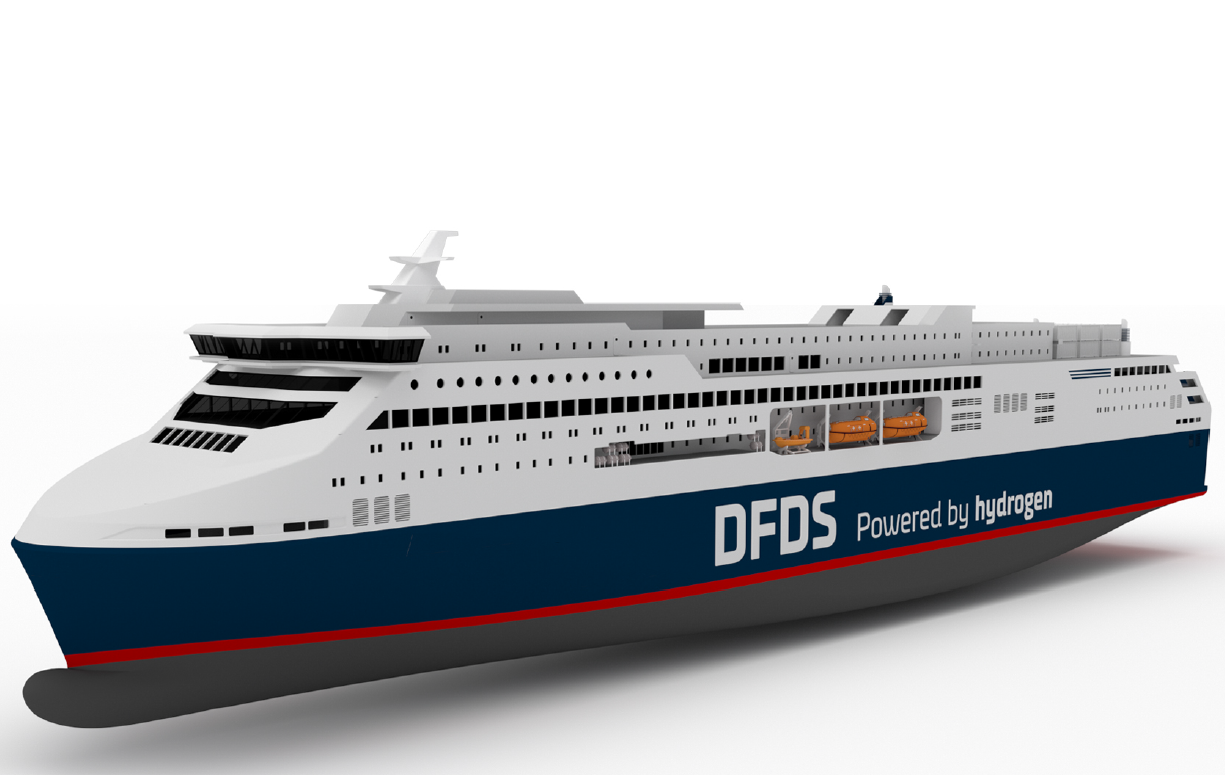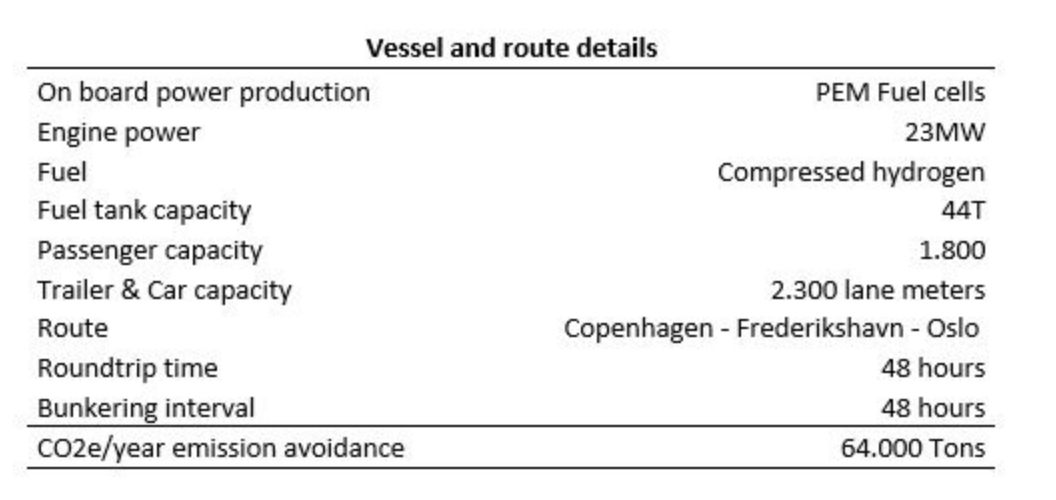DFDS and its partners have applied for EU support for development of a ferry powered by electricity from a hydrogen fuel cell which only emits water.
Green hydrogen is to be produced by a projected offshore wind energy-powered electrolyser plant in Greater Copenhagen.

A group of companies have partnered up to develop a 100% hydrogen powered ferry for DFDS’ Oslo – Frederikshavn – Copenhagen route.
The ferry will be powered by electricity from a hydrogen fuel cell system that emits only water and can produce up to 23 MW to propel the ferry.
“The largest fuel cell systems today produce only 1-5 MW, and the development of such large-scale fuel cell installations for an electric ferry is a monumental task. We can only succeed in partnerships with companies that together can muster some of the globe’s finest expertise in design, approval, building, financing and operation of innovative vessels,” says Torben Carlsen, CEO of DFDS.
The partnership committed to achieving this includes DFDS, ABB, Ballard Power Systems Europe, Hexagon Purus, Lloyd’s Register, KNUD E. HANSEN, Ørsted and Danish Ship Finance.
“Together, we expect to learn how to make these fuel types and technologies commercially viable, which is key to a transition of the industry to climate neutrality, which is also the ultimate goal of DFDS’ climate plan,” says Torben.
The partnership has applied for support from the EU Innovation Fund. As there are no ferries of this kind in the world today, the development of the ferry will also require public involvement. However, if the project develops as projected, the ferry could be in full operation on the route as early as 2027.
The hydrogen will be produced locally in Greater Copenhagen based on offshore wind, and the project will investigate how to optimally integrate with the local energy system.
The ferry that has the working name Europa Seaways, is designed for 1,800 passengers and has capacity for 120 lorries or 380 cars.

ABB Marine & Ports: “With the increasing demand for solutions that enable sustainable, responsible shipping, we are confident that fuel cells will play an important role in helping the marine industry meet CO2 reduction targets. Collaborating on this project with partners across the value chain is an important step on the marine industry’s journey towards enabling zero-emission operation for RoPax vessels.” Jostein Bogen, Global Product Manager, ABB Marine & Ports.
Ballard Power Systems Europe A/S “Fuel cells in combination with hydrogen will play a key role in helping the marine industry address GHG emissions. With the “Hydrogen EU-ROPAX” project and the strong partnership behind it, we will not only meet the demand for zero-emission marine solutions we will also contribute to creating green jobs and growth in Denmark and ensure a Danish leadership role within the marine segment.” Jesper Themsen, President & Chief Executive Officer, Ballard Power Systems Europe A/S
Hexagon Purus “The DFDS EU-ROPAX project enables all parties to stretch their capabilities to look beyond any comparable solution seen so far. It is a large-scale hydrogen value chain exploration that will move our visions,” Michael Kleschinski - EVP Light Duty, Distribution & Cylinders
KNUD E. HANSEN “Due to the ongoing global fight to reduce greenhouse gas emissions it is more important than ever for designers to collaborate with ship owners, regulators and equipment makers to innovate and rethink how we design ships. This project is a great example of how much we can push traditional thinking. By combining new ideas and close collaboration we can show how the future in ship design could potentially look.” Finn Wollesen Petersen, Managing Director, KNUD E. HANSEN
Lloyd’s Register “In order for the industry to reach the IMO 2050 ambitions it shall need to transition to zero carbon fuels, this is a complicated pathway not just in terms of technology, but also infrastructure. The partners in the DFDS project are industry leaders within their respective fields, from zero carbon energy company through fuel storage and fuel cell providers. This collaboration supported by experts from the Maritime Decarbonisation Hub will help solve a number of unanswered questions. LR will help ensure a thorough and impartial de-risking of this hydrogen fuelled Ro-Pax ship design, including safety assessment of the complete supply chain.” Charles Haskell, Decarbonisation Progamme Manager at LR.
Ørsted “Renewable hydrogen and other sustainable fuels will be key in decarbonizing the maritime sector and heavy transport as a whole to meet Danish and international climate targets. If regulators are willing to put the right framework in place to enable the demand and supply side of sustainable fuels, Danish companies are willing to invest in large-scale Power-to-X-projects. This project is another proof of the strong potential of renewable hydrogen production, powered by continued build-out of offshore wind.” Anders Nordstrøm, Vice President and head of Ørsted’s hydrogen activities.
Source: DFDS